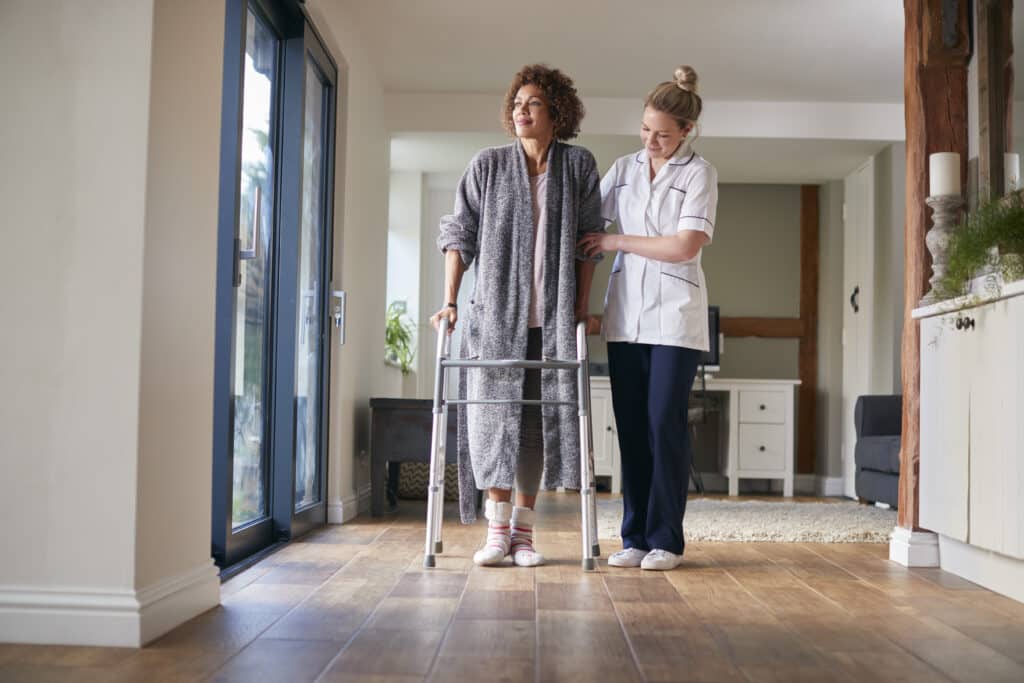Hospice Supportive Home Care
Your choice of Personal Companion services is broad but when it comes to choosing the right care for a loved one, Jarrett Loyal Care is the agency you can trust.
Our mission is to improve quality of life by providing qualified professionals to help meet a wide range of short and long term needs. Through coordinated care and support for families, Jarrett Loyal Care enables individuals to remain in the safety and comfort of their own home environment. Working closely with your physician and other health providers we select the right in home care services and work hard to ensure the peace of mind that your family deserves.
We specialize in care and daily living assistance to an array of individuals at home and in facilities. Whether you need daily or weekly assistance due to aging, illness, recovery, or rehabilitation, our caregivers will provide an individualized service that you can trust. We understand that not one care plan fits all. Daily services can include anything from meal preparation, hygiene, cleaning, and supervision. We will take the time to get to know you and develop an individualized care plan that fits your specific needs. Companionship is key to a trusted relationship with our caregivers. We not only strive to help you with everyday tasks but want to develop a caring relationship with you. We provide one-on-one attention and care that cannot compare in other settings.
It can be difficult to care for a loved one who is terminally or chronically ill. Non-medical home care is also needed to help them with their daily activities. It is important for your loved one to receive hospice care at the end-of-life. However, it is also a smart idea to hire a caregiver to provide non-medical homecare services.
Non-medical homecare services, as the name implies, provide support for aspects of the patient’s daily living that are not covered by traditional hospice care.
Comforts of Home: Seniors, in particular, feel most at home. Research has also shown that people simply feel more comfortable after being hospitalized if they are able to return home, where their surroundings are familiar and where family members are available.
Assistance With Daily Activities: In addition to providing companionship, caregivers can also assist patients with daily activities such as personal care and grooming. Patients with advanced illnesses often find it difficult to perform daily tasks such as dressing, bathing, shaving and dressing. Caregivers can help the patient prepare meals and cook, as well as clean and do laundry.
Medication reminders: While caregivers can’t provide medical care, they are able to remind patients of their medication. Both picking up and helping patients to take their medication on time fall within their responsibilities.
Compassionate care: A caregiver will dedicate their full attention to you and your loved ones. This service is personal and will meet their physical, emotional, and companionship needs.
What is Hospice Care?
Hospice care focuses on the care, comfort, and quality of life of a person with a serious illness who is approaching the end of life.
At some point, it may not be possible to cure a serious illness, or a patient may choose not to undergo certain treatments. Hospice is designed for this situation. The patient beginning hospice care understands that his or her illness is not responding to medical attempts to cure it or to slow the disease’s progress.
Our person-centered care process selects caregivers based on the needs and interests of the client and family. Get Started today!
Providing the best Hospice Supportive Home Care for seniors and families in Hartford County, New Haven, Fairfield County & Litchfield County, Norwalk, Stamford, Danbury, Milford, Westport, Old Greenwich, Greenwich, Middletown, Darien, New Canaan and surrounding areas.

Where is Hospice Care Provided?
Hospice is an approach to care, so it is not tied to a specific place. It can be offered in two types of settings — at home or in a facility such as a nursing home, hospital, or even in a separate hospice center.
Hospice care brings together a team of people with special skills — among them nurses, doctors, social workers, spiritual advisors, and trained volunteers. Everyone works together with the person who is dying, the caregiver, and/or the family to provide the medical, emotional, and spiritual support needed.
A member of the hospice team visits regularly, and someone is usually always available by phone — 24 hours a day, seven days a week. Hospice may be covered by Medicare and other insurance companies. Check to see if insurance will cover the person’s particular situation.
Our Founder has a MSN, RNC-OB, CNS, a Masters Degree prepared professional with credentials as a Clinical Nurse Specialist in Adult Care and National Board Certification in Inpatient Obstetric Nursing.

What are the benefits of hospice care?
Once a patient has accepted hospice care, they will receive routine care aimed at increasing their comfort and quality of life as much as possible. Routine care may include pain management, symptom management, emotional and spiritual counseling for the patient and family, assistance with daily tasks, nutritional services, and therapeutic services.
Routine hospice care can be provided wherever you call home; whether in a skilled nursing facility, assisted living facility, memory care, or your own home. Care will be intermittent based on the patient’s needs.
Home hospice care provides comfort to patients who choose to focus on quality of life rather than cure-oriented care for a terminal illness.
Families of people who received care through a hospice program are more satisfied with end-of-life care than those who did not have hospice services. Also, hospice recipients are more likely to have their pain controlled and less likely to undergo tests or be given medicines they don’t need, compared with people who don’t use hospice care.
Hospice Care at Home; What You Need to Know
For patients receiving in-home hospice care, the primary caregiver not only provides most of the physical care for the patient, but also helps with keeping records of symptoms and other problems.
The primary caregiver can share the physical care responsibilities with other family members or hired caregivers through Jarrett Loyal Care, but takes responsibility for communication with the hospice team, and for scheduling caregivers in the home as needed.
Hospice care staff members are kind and caring. They communicate well, are good listeners, and want to support families during the last stage of an advanced illness. They’re usually specially trained in the unique issues surrounding death and dying and are given ongoing education and support to help with the emotional demands of the job.
It’s important to know that home hospice may require that someone be home with the patient 24 hours a day, 7 days a week. This may be a problem for people who live alone or whose partner or adult children have full-time jobs. But in most cases, creative scheduling and the assistance on a non-medical home care agency like Jarrett Loyal Care can help.
Members of the hospice staff will visit regularly to check on the patient, family, and caregivers. They will make sure that any symptoms are under control and give any needed care and services.
References:
https://www.nia.nih.gov/health/what-are-palliative-care-and-hospice-care
You have questions and we have answers, contact us today and one of our Jarrett Loyal Care staff members will contact you shortly.